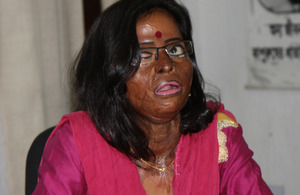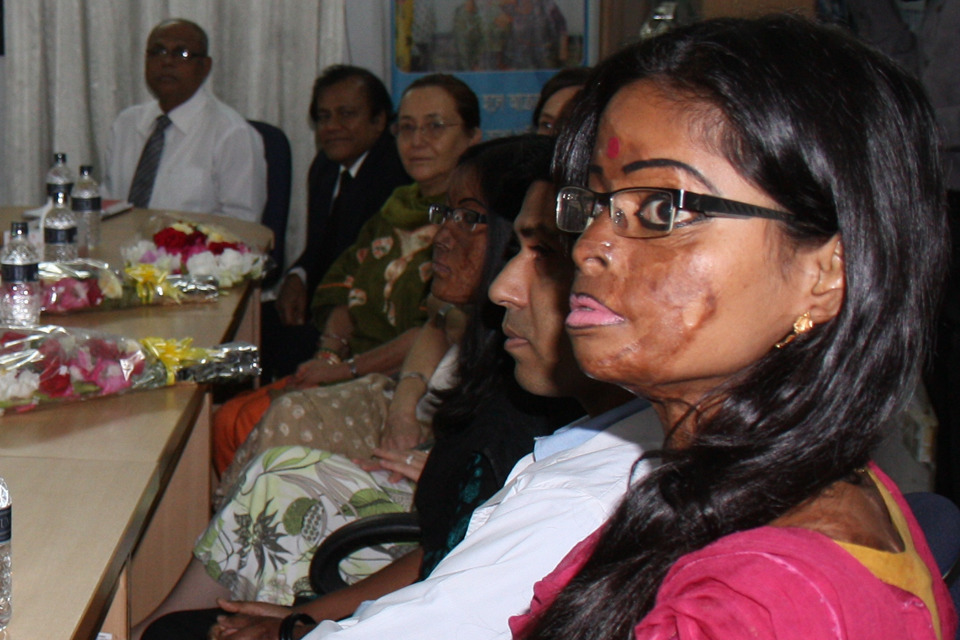From acid victim to activist: Hasina's courageous journey
How the Acid Survivors Foundation is helping victims of acid attacks in Bangladesh

Hasina - an acid attack survivor turned activist. Picture: Narayan Debnath/DFID
Violence against women is widely condemned in Bangladesh but the country still witnesses horrific reminders of what people are capable of inflicting on others.
The Acid Survivors Foundation (ASF), supported by UK aid, is a trusted partner in the British Government’s work to reduce violence against women and girls in Bangladesh. Hasina is one of many victims who found the ASF to be her last beacon of hope after her life saw a tragic turn of events.
Hasina’s story
“When I was 17 years old, a man who worked for my family for 12 years as a labourer threw acid on me when I was sleeping with my siblings in my family home. I didn’t realise what it was at first. It just felt like something warm but with a sharp burning sensation,” says Hasina. “I immediately ran to my mother. No one knew what to do as I was rolling on the ground and screaming for help.”
After being unable to receive the right treatment because of resource constraints at a government hospital, ASF came to Hasina’s rescue providing two months post-operative nursing care for free. Sadly her ordeal did not end there - even the best treatment couldn’t remove all trace of the acid attack. On returning home she discovered the social stigma of being disfigured.
“No one actually threw me out of the village but people seemed scared of me. My pregnant friend’s mother asked her not to see me for fear that her child would come out like me. As a result of all this, I hated going out. I couldn’t move freely. I would keep myself covered up.”
Once again she found support from ASF, which had established a new hospital and was attracting volunteer plastic surgeons from Bangladesh and overseas. Eight operations later, her face was much nearer to its pre-attack condition.
Unfortunately Hasina’s father did not have enough money to continue both his daughter’s treatment and pursue a legal case to bring charges against her attacker.
Hope for the future
Hasina’s interest in joining the legal unit of ASF as an intern helped her take back control of her life and seek justice. The Foundation arranged an interview with the country’s leading Bangla newspaper on International Women’s Day and Hasina was able to publicise her case and encourage society to take action. Hasina remembers this clearly as it prompted the perpetrator’s arrest.
“My picture came out in the paper, and so did my comments on police corruption and the failure to arrest those responsible. The then Inspector General of Police saw the story and was surprised to see my status. He gave an order for an arrest to be made within 24 hours. “After waiting agonisingly for 3 years, suddenly the perpetrator was arrested literally within 24 hours, and was convicted and sentenced to life imprisonment.”
Hasina is now hopeful for her future and believes that society is more aware of the issues. “There has been a lot of change in all these years. People are more conscious, sensitive and understanding about acid attacks and are trying to do something. I am thinking about purchasing a piece of land for my future. I believe there are more good people than bad people and if we have the political will, we can combat acid attacks.”
Advocacy and raising awareness

Hasina participates in awareness raising campaigns arranged by the ASF. Here she attends the Eliminating Violence Against Women event on 25 November 2012. Picture: Narayan Debnath/DFID
Whilst continuing her studies and working, Hasina has participated in various national and international platforms involving government officials, donors, police, NGOs, and the media. She has shared her story to raise awareness on the challenges faced by survivors in pursuing legal action as well as contributing in workshops with the police to help identify loopholes in the current acid laws.
Hasina has participated in many awareness raising campaigns arranged by the ASF and these lobby efforts by the foundation have encouraged the Government of Bangladesh to introduce into law the District Acid Control Committees (DACC) and the National Acid Control Council (NACC). The NACC and DACC control acid crimes by mandating stringent punishment ranging from between three to 15 years imprisonment and a hefty fine, life imprisonment to a maximum statement of death penalty. The Bangladeshi social welfare department along with ASF is working together to address acid attacks and bring the number of incidents to a halt.
It is imperative to support the victims who are in need and maintain the spotlight on acid attacks and violence against women. Tackling this issue is an example of how UK aid from the Department for International Development is focusing its efforts on women and girls to support wider development objectives.
Facts and Stats
ASF’s main aim is to prevent acid attacks and protect survivors, helping them to gain economic independence and recover their self confidence.
The ASF’s advocacy and lobby efforts focuses on effective implementation of the laws through dialogue with law enforcing authorities at the local and national level, mass awareness raising campaigns, and advocating with government service providers to ensure effective rehabilitation of survivors.
UK aid has been funding ASF through its rights and governance challenge fund since 2004.
Over the last 10 years over 3,000 acid attack survivors were supported through this programme. Thankfully the incident rate of attacks has more than halved and is declining further.